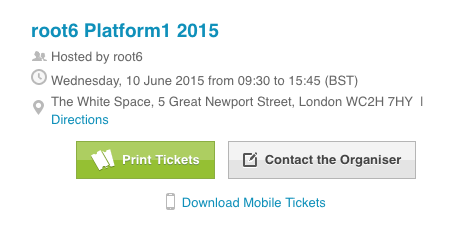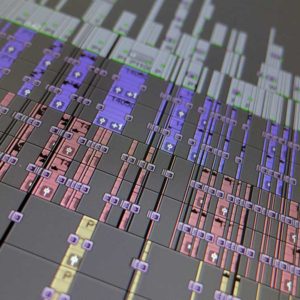I created this news event review after Soho based technology supplier root6 held another of their well-regarded ‘Platform 1’ industry news and update events at the White Cube in Central London.

Raising industry product awareness
Soho based technology supplier root6 held another of their well-regarded ‘Platform 1’ industry news and update events at the White Cube in Central London. Four separate one-hour engineering and technical sessions were arranged for the day: Efficient, File-Based Delivery – Working Remotely, For Real – Migrating from SDI to IT Networks – 4K & UHD – Beyond the Hype. I found the day very interesting and educational with lectures from a range of highly knowledgeable technical professionals (who I believe all work for root6). As well as talking through the main points mentioned above the presentations also featured a series of technical slides. A range of available solutions featuring products (for which root6 acts as a supplier) was also discussed. Representatives of each featured product were on hand in a separate room to talk through their kit in more detail during the tea and lunch breaks. Irrespective of the gentle sales pitch there was plenty of well-informed technical knowledge for everyone present to absorb.
Technical highlights.
Some of the highlights of the day for me included gaining a wider understanding and awareness of:
DPP Delivery:
Bill Baker talked us through using Content Agent for broadcast AS-11 UKDPP file delivery (now with the new insert edit feature for last-minute changes) and the use of Meta Agent for managing complex project meta-data.
DCP: Digital Cinema Packaging:
As a broadcast video editor, I’ve not had any experience with DCP so it was good to get a better understanding and to see inside the folder structures with its mix of files. Clipster is a product that allows the DCP file to be opened up with a timeline view for editing. The audio and video forensic features (encryption, watermarking and fingerprinting) of the Civolution Nexguard were explained.
IMF: Inoperable Master Package:
IMF is a B2B finished master file for sending out to distributors, post houses, ad agencies and broadcasters who then make all required worldwide and broadcast versions from that IMF file. Allows for flexible versioning as any kind of deliverable can be created from the one master file.
Avid Everywhere and Media Composer Cloud:
Was helpful to gain further insight into how supported clients of root6 are now using this flexible and versatile workflow with much success. Remote working is giving clients the option of additional capacity, higher throughput and content security.
Remote working and specifically PCoIP editing:
Engineer Matt Ward clearly explained how this works. The computer CPU and editing media assets are all located in a remote location away from the actual editor’s monitor. The editor plugs in their edit display monitors to a network-connected Amulet Hotkey DXZ4. The DXZ4 communicates the editing actions and mouse functions then renders the ever-changing desktop image in real-time to the editor. The editor edits using the editing application via the remote CPU and media assets. It’s only the desktop image that is being sent down the line so is useable on a range of broadband network connections. I am sure this will be a very exciting concept for many post-production companies and editors alike. I’m now looking for a suitable beach hut that comes with a good network connection for my next long-form editing project.
CWDM – Coarse Wavelength Division Multiplexing:
A way of combining multiple signals at various wavelengths for transmission on one fibre channel.
Test signals for digital video:
Colour Bars for digital video are ineffective for checking compression. Check out the TG-100 SRI Visualizer for testing and verifying the quality of digital video signal chains. Awesome test visuals!
I am sure root6 would be delighted to hear from you should you need to know any more about any of the above. Complementing their wide range of equipment supply, root6 also provides systems integration services, technical support and training.
Knowledge Sharing
The enlightened know that by embracing both the ‘helping each other’ and ‘knowledge sharing’ concepts better relationships are fostered, respect is gained and in the longer term a greater sense of trust is built with existing and future clients. To their credit, these are things that root6 seem to have fully embraced.
Reflecting on technical expertise
Days like this awareness session seem pretty rare in London but are a very welcome highlight. I had an opportunity to chat with a few of the friendly faces and ex-colleagues attending. Andrew sitting next to me suggested that there always seems to be more of this kind of event running in the States. We agreed that it would be great to see more of the broadcast industry organising great informative days like this in London and across the UK. Days like this help professionals stay in touch with industry developments and enable a greater connection with creative and technical networks.
Leaving the White Cube I was left thinking about where the industry now gets its training. It made me reflect back to my BBC days when it maintained a large and skilled post-production facility with over 160 editors. In those days BBC post-production used to train a large number of individuals (including myself) to very high skill levels. Seeing as the BBC no longer supports any great concept of in-house post-production all that industry training is no longer happening. Because of this, I imagine a large bulk of the UK post-production training has now ended. If commercial companies have smaller budgets for training is the technical skill level of the industry now being affected? From my BBC days, I do miss working with a team of highly skilled editors, IT experts and engineers. You always learn so much by being surrounded by creative and talented people.
Thanks again to root6 for their friendly generosity (which included tea, biscuits and lunchtime sandwiches) and all their technical expertise. I look forward to the next one.



